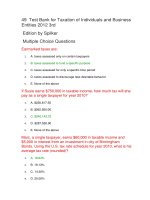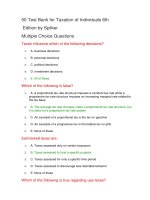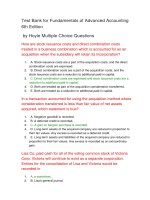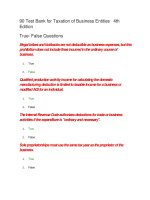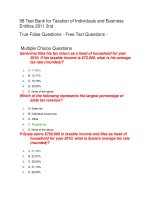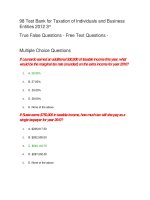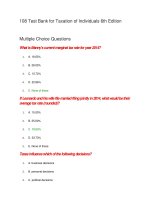46 test bank for taxation of business entities 6th
Bạn đang xem bản rút gọn của tài liệu. Xem và tải ngay bản đầy đủ của tài liệu tại đây (90.65 KB, 15 trang )
46 Test Bank for Taxation of Business Entities 6th
Edition by Spilker Multiple Choice Questions
Which of the following is a payment liability?
1.
A. Tort claims
2.
B. Refunds
3.
C. Insurance premiums
4.
D. Real estate taxes
5.
E. All of these
Dick pays insurance premiums for his employees. What type of
insurance premium is not deductible as compensation paid to the
employee?
1.
A. Health insurance with benefits payable to the employee.
2.
B. Whole life insurance with benefits payable to the employee's dependents.
3.
C. Group term life insurance with benefits payable to the employee's
dependents.
4.
D. key man life insurance with benefits payable to Dick.
5.
E. All of these are deductible by Dick.
Individual proprietors report their business income and deductions
on:
1.
A. Form 1065
2.
B. Form 1120S
3.
C. Schedule C
4.
D. Schedule A
5.
E. Form 1041
Brad operates a storage business on the accrual method. On July 1
Brad paid $48,000 for rent on his storage warehouse and $18,000
for insurance on the contents of the warehouse. The rent and
insurance covers the next 12 months. What is Brad's deduction for
the rent and insurance?
1.
A. $48,000 for the rent and $18,000 for the insurance.
2.
B. $24,000 for the rent and $18,000 for the insurance.
3.
C. $24,000 for the rent and $9,000 for the insurance.
4.
D. $48,000 for the rent and $9,000 for the insurance.
5.
E. None of these is true.
After a business meeting with a prospective client Holly took the
client to dinner and the theatre. Holly paid $290 for the meal and
$250 for the theatre tickets, amounts that were reasonable under
the circumstances. What amount of these expenditures can Holly
deduct as a business expense?
1.
A. $540
2.
B. $415
3.
C. $270
4.
D. None unless Holly discussed business with the client during the meal and
the entertainment.
5.
E. None - the meals and entertainment are not deductible except during
travel.
Bill operates a proprietorship using the cash method of accounting,
and this year he received the following payments: • $100 in cash
from a customer for services rendered this year; • a promise to pay
$200 from a customer for services rendered this year; • tickets to a
football game worth $250 as payment for services performed last
year; • a check for $170 for services rendered this year that Bill
forgot to cash. How much income should Bill realize on Schedule
C?
1.
A. $100
2.
B. $300
3.
C. $350
4.
D. $270
5.
E. $520
Which of the following expenditures is most likely to be deductible
for a construction business?
1.
A. A fine for a zoning violation.
2.
B. A tax underpayment penalty.
3.
C. An "under the table" payment to a government representative to obtain a
better price for raw materials.
4.
D. A payment to a foreign official to expedite an application for a business
permit.
5.
E. An arm's length payment to a related party for emergency repairs of a
sewage line.
Which of the following is NOT likely to be allowed as a current
deduction for a landscaping and nursery business?
1.
A. cost of fertilizer
2.
B. accounting fees
3.
C. cost of a greenhouse
4.
D. cost of uniforms for employees
5.
E. a cash settlement for trade name infringement
Which of the following cannot be selected as a valid tax year end?
1.
A. December 31st
2.
B. January 31st
3.
C. The last Friday of the last week of June.
4.
D. December 15th
5.
E. A tax year can end on any of these days.
Don operates a taxi business, and this year one of his taxis was
damaged in a traffic accident. The taxi was originally purchased for
$32,000 and the adjusted basis was $2,000 at the time of the
accident. The taxi was repaired at a cost of $2,500 and insurance
reimbursed Don $700 of this cost. What is the amount of Don's
casualty loss deduction?
1.
A. $1,300
2.
B. $2,500
3.
C. $1,800
4.
D. $2,000
5.
E. Don is not eligible for a casualty loss deduction.
Clyde operates a sole proprietorship using the cash method. This
year Clyde made the following expenditures: $480 to U.S. Bank for
12 months of interest accruing on a business loan from September
1st of this year through August 31st of next year. $600 for 12
months of property insurance beginning on July 1 of this year. What
is the maximum amount Clyde can deduct this year?
1.
A. $760
2.
B. $600
3.
C. $480
4.
D. $160
5.
E. $360
Which of the following is a true statement about travel that has both
business and personal aspects?
1.
A. Transportation costs are always fully deductible.
2.
B. Meals are not deductible for this type of travel.
3.
C. Only half of the cost of meals and transportation is deductible.
4.
5.
D. The cost of lodging, and incidental expenditures is limited to those incurred
during the business portion of the travel.
E. None of these
Joe is a self employed electrician who operates his business on the
accrual method. This year Joe purchased a shop for his business
and at year end he received a bill for $4,500 of property taxes on
his shop. Joe didn't pay the taxes until after year end. Which of the
following is a true statement?
1.
2.
A. If he elects to treat the taxes as a recurring item, Joe can accrue and
deduct $4,500 of taxes on the shop this year.
B. The taxes are a payment liability.
3.
C. The taxes would not be deductible if Joe's business was on the cash
method.
4.
D. Unless Joe makes an election, the taxes are not deductible this year.
5.
E. All of these are true.
In order to deduct a portion of the cost of a business meal which of
the following conditions must be met?
1.
A. A client (not a supplier or vendor) must be present at the meal.
2.
B. The taxpayer or an employee must be present at the meal.
3.
C. The meal must occur on the taxpayer's business premises.
4.
D. None of these is a condition for a deduction.
5.
E. All of these are conditions for a deduction.
Which of the following is a true statement?
1.
A. Meals, lodging, and incidental expenditures are only deductible if the
taxpayer is away from home overnight while traveling.
2.
B. Meals are deductible for an employee who is forced to work during the
lunch hour.
3.
C. When a taxpayer travels solely for business purposes, only half of the
costs of travel are deductible.
4.
D. If travel has both business and personal aspects, the cost of transportation
is always deductible but the deductibility of lodging depends upon whether
business is conducted that day.
5.
E. None of these is true.
George operates a business that generated adjusted gross income
of $250,000 and taxable income of $170,000 this year (before the
domestic production activities deduction). Included in income was
$70,000 of qualified production activities income. George paid
$60,000 of wages to employees engaged in domestic
manufacturing. What domestic production activities deduction will
George be eligible to claim this year?
1.
A. $5,400
2.
B. $6,300
3.
C. $7,200
4.
D. $15,300
5.
E. $22,500
Which of the following is NOT considered a related party for the
purpose of limitation on accruals to related parties?
1.
A. Spouse when the taxpayer is an individual.
2.
B. A partner when the taxpayer is a partnership.
3.
C. Brother when the taxpayer is an individual.
4.
D. A minority shareholder when the taxpayer is a corporation.
5.
E. All of these are related parties.
Mike started a calendar year business on September 1st of this
year by paying 12 months rent on his shop at $1,000 per month.
What is the maximum amount of rent that Mike can deduct this year
under each type of accounting method?
1.
A. $12,000 under the cash method and $12,000 under the accrual method
2.
B. $4,000 under the cash method and $12,000 under the accrual method
3.
C. $12,000 under the cash method and $4,000 under the accrual method
4.
D. $4,000 under the cash method and $4,000 under the accrual method
5.
E. $4,000 under the cash method and zero under the accrual method
Which of the following is a true statement about a request for a
change in accounting method?
1.
A. Some requests are automatically granted.
2.
B. Most requests require the permission of the Commissioner.
3.
C. Many requests require payment of a fee and a good business purpose for
the change.
4.
D. Form 3115 is required to be filed with a request for change in accounting
method.
5.
E. All of these are true.
Which of the following expenses are completely deductible?
1.
A. $1,000 spent on compensating your brother for a personal expense.
2.
B. $50 spent on meals while traveling on business.
3.
C. $2,000 spent by the employer on reimbursing an employee for
entertainment.
4.
D. All of these expenses are fully deductible.
5.
E. None of these expenses can be deducted in full.
Which of the following is a true statement about accounting for
business activities?
1.
A. An overall accounting method can only be adopted with the permission of
the Commissioner.
2.
B. An overall accounting method is initially adopted on the first return filed for
the business.
3.
C. The cash method can only be adopted by individual taxpayers.
4.
D. The accrual method can only be adopted by corporate taxpayers.
5.
E. None of these is true.
Which of the following business expense deductions is most likely
to be unreasonable in amount?
1.
A. Compensation paid to the taxpayer's spouse in excess of salary payments
to other employees.
2.
B. Amounts paid to a subsidiary corporation for services where the amount is
in excess of the cost of comparable services by competing corporations.
3.
C. Cost of entertaining a former client when there is no possibility of any
future benefits from a relation with that client.
4.
D. All of these are likely to be unreasonable in amount.
5.
E. None of these is likely to be unreasonable in amount.
Manley operates a law practice on the accrual method and calendar
year. At the beginning of the year Manley's firm had an allowance
for doubtful accounts with a balance of $15,000. At the end of the
year, Manley recorded bad debt expense of $23,000 and the
balance of doubtful accounts had increased to $18,000. What is
Manley's deduction for bad debt expense this year?
1.
A. $23,000
2.
B. $3,000
3.
C. $26,000
4.
D. $5,000
5.
E. $20,000
Which of the following types of expenditures is not subject to
capitalization under the UNICAP rules?
1.
A. selling expenditures
2.
B. cost of manufacturing labor
3.
C. compensation of managers who supervise production
4.
D. cost of raw materials
5.
E. All of these are subject to capitalization under the UNICAP rules.
Which of the following is an explanation for why insurance
premiums on a key employee are not deductible?
1.
A. The insurance deduction would offset taxable income without the potential
for the proceeds generating taxable income.
2.
B. The federal government does not want to subsidize insurance companies.
3.
C. It is impractical to trace insurance premiums to the receipt of proceeds.
4.
D. Congress presumes that all expenses are not deductible unless specifically
allowed in the Internal Revenue Code.
5.
E. This rule was grandfathered from a time when the IRC disallowed all
insurance premiums deductions.
Paris operates a talent agency as a sole proprietorship, and this
year she incurred the following expenses in operating her talent
agency. What is the total deductible amount of these expenditures?
$1,000 dinner with a film producer where no business was
discussed; $500 lunch with sister Nicky where no business was
discussed; $700 business dinner with a client but Paris forgot to
keep any records (oops!); $900 tickets to the opera with a client
following a business meeting
1.
A. $450
2.
B. $900
3.
C. $1,100
4.
D. $1,200
5.
E. $800
Which of the following is a true statement?
1.
A. Interest expense is not deductible if the loan is used to purchase municipal
bonds.
2.
B. Insurance premiums are not deductible if paid for "key man" life insurance.
3.
C. One half of the cost of business meals is not deductible.
4.
D. All of these are true.
5.
E. None of these is true.
Which of the following types of transactions may not typically be
accounted for using the cash method?
1.
A. sales of inventory
2.
B. services
3.
C. purchases of machinery
4.
D. payments of debt
5.
E. sales of securities by an investor
Kip started a wholesale store this year selling bulk peanut butter. In
January of this year Kip purchased an initial five tubs of peanut
butter for a total cost of $5,000. In July Kip purchased three tubs for
a total cost of $6,000. Finally, in November Kip bought two tubs for
a total cost of $1,000. Kip sold six tubs by year end. What is Kip's
ending inventory under the FIFO cost-flow method?
1.
A. $12,000
2.
B. $6,000
3.
C. $5,000
4.
D. $2,500
5.
E. $1,000
Qualified production activities income is defined as follows for
purposes of the domestic production activities deduction
1.
A. net income from selling or leasing property the taxpayer manufactured in
the United States.
2.
B. revenue from selling or leasing property the taxpayer manufactured in the
United States.
3.
C. revenue from selling or leasing property the taxpayer manufactured in the
United States but the revenue was less that 50 percent of qualifying wages
used in the production.
4.
D. 6 percent of revenue from selling or leasing property the taxpayer
manufactured in the United States.
5.
E. None of these
Which of the following is likely to be a fully deductible business
expense?
1.
A. Salaries in excess of the industry average paid to attract talented
employees.
2.
B. The cost of employee uniforms that can be adapted to ordinary personal
wear.
3.
C. A speeding fine paid by a trucker who was delivering a rush order.
4.
D. The cost of a three-year subscription to a business publication.
5.
E. None of these is likely to be deductible.
When does the all-events test under the accrual method require the
recognition of income from the sale of goods?
1.
A. when the title of the goods passes to the buyer.
2.
B. when the business receives payment.
3.
C. when payment is due from the buyer.
4.
D. the earliest of these three dates.
5.
E. None of these.
Big Homes Corporation is an accrual method calendar year
taxpayer that manufactures and sells modular homes. This year for
the first time Big Homes was forced to offer a rebate on the
purchase of new homes. At year end, Big Homes had paid $12,000
in rebates and was liable for an additional $7,500 in rebates to
buyers. What amount of the rebates, if any, can Big Homes deduct
this year?
1.
A. $12,000 because rebates are payment liabilities.
2.
B. $19,500 because Big Homes is an accrual method taxpayer.
3.
4.
5.
C. $19,500 if this amount is not material, Big Homes expects to continue the
practice of offering rebates in future years, and Big Homes expects to pay the
accrued rebates before filing their tax return for this year.
D. $12,000 because the $7,500 liability is not fixed and determinable.
E. Big Homes is not entitled to a deduction because rebates are against
public policy.
Colbert operates a catering service on the accrual method. In
November of year 1 Colbert received a payment of $9,000 for 18
months of catering services to be rendered from December 1st of
year 1 through May 31st year 3. When must Colbert recognize the
income if his accounting methods are selected to minimize income
recognition?
1.
A. $500 is recognized in year 1, $6,000 in year 2, and $2,500 in year 3.
2.
B. $500 is recognized in year 1 and $8,500 in year 2.
3.
C. $9,000 is recognized in year 3.
4.
D. $2,500 is recognized in year 1 and $6,500 in year 2.
5.
E. $9,000 is recognized in year 1.
According to the Internal Revenue Code §162, deductible trade or
business expenses must be one of the following?
1.
A. incurred for the production of investment income
2.
B. ordinary and necessary
3.
C. minimized
4.
D. appropriate and measurable
5.
E. personal and justifiable
Beth operates a plumbing firm. In August of last year she signed a
contract to provide plumbing services for a renovation. Beth began
the work that August and finished the work in December of last
year. However, Beth didn't bill the client until January of this year
and she didn't receive the payment until March when she received
payment in full. When should Beth recognize income under the
accrual method of accounting?
1.
A. In August of last year
2.
B. In December of last year
3.
C. In January of this year
4.
D. In March of this year
5.
E. In April of this year
Todd operates a business using the cash basis of accounting. At
the end of last year, Todd was granted permission to switch his
sales on account to the accrual method. Last year Todd made
$420,000 of sales on account and $64,000 was uncollected at the
end of the year. What is the Todd's §481 adjustment for this year?
1.
A. increase income by $420,000
2.
B. increase income by $16,000
3.
C. increase expenses by $64,000
4.
D. increase expenses by $420,000
5.
E. Todd has no §481 adjustment this year.
This year Clark leased a car to drive between his office and various
work sites. Clark carefully recorded that he drove the car 23,000
miles this year and paid $7,200 of operating expenses ($2,700 for
gas, oil, and repairs, and $4,500 for lease payments). What amount
of these expenses may Clark deduct as business expenses?
1.
A. $7,200
2.
B. Clark cannot deduct these costs but he must use the mileage method to
determine any deduction.
3.
C. $4,500
4.
D. $2,700
5.
E. Clark is not entitled to any deduction if he used the car for any personal
trips.
Jim operates his business on the accrual method and this year he
received $4,000 for services that he intends to provide to his clients
next year. Under what circumstances can Jim defer the recognition
of the $4,000 of income until next year?
1.
A. Jim can defer the recognition of the income if he absolutely promises not to
provide the services until next year.
2.
B. Jim must defer the recognition of the income until the income is earned.
3.
C. Jim can defer the recognition of the income if he has requested that the
client not pay for the services until the services are provided.
4.
D. Jim can elect to defer the recognition of the income if the income is not
recognized for financial accounting purposes.
5.
E. Jim can never defer the recognition of the prepayments of income.
Which of the following is a true statement about impermissible
accounting methods?
1.
2.
3.
A. An impermissible method is adopted by using the method to report results
for two consecutive years.
B. An impermissible method may never be used by a taxpayer.
C. Cash method accounting is an impermissible method for partnerships and
Subchapter S electing corporations.
4.
D. There is no accounting method that is impermissible.
5.
E. None of these is true.
The IRS would most likely apply the arm's length transaction test to
determine which of the following?
1.
A. whether an expenditure is related to a business activity
2.
B. whether an expenditure will be likely to produce income
3.
C. timeliness of an expenditure
4.
D. reasonableness of an expenditure
5.
E. All of these
Jones operates an upscale restaurant and he pays experienced
cooks $35,000 per year. This year he hired his son as an
apprentice cook. Jones agreed to pay his son $40,000 per year.
Which of the following is a true statement about this transaction?
1.
2.
A. Jones will be allowed to deduct $40,000 only if his son eventually develops
into an expert cook.
B. Jones will be allowed to accrue $40,000 only if he pays his son in cash.
3.
C. Jones will be allowed to deduct $35,000 as compensation and another
$5,000 can be deducted as an employee gift.
4.
D. Jones can only deduct $20,000 because an apprentice cook is only worth
half as much as an experienced cook.
5.
E. None of these.
Ronald is a cash method taxpayer who made the following
expenditures this year. Which expenditure is completely deductible
in this period as a business expense?
1.
A. $4,000 for rent on his office that covers the next 24 months.
2.
B. $3,000 for a new watch for the mayor to keep "good relations" with city hall.
3.
C. $2,500 for professional hockey tickets distributed to a customer to generate
"goodwill" for his business.
4.
D. $55 to collect an account receivable from a customer who has failed to pay
for services rendered.
5.
E. None of these is completely deductible.
Which of the following is a true statement?
1.
A. Meals are never deductible as a business expense.
2.
B. An employer can only deduct half of any meals provided to employees.
3.
C. The cost of business meals must be reasonable.
4.
5.
D. A taxpayer can only deduct a meal for a client if business is discussed
during the meal.
E. None of these is true.
Which of the following is a true statement about the domestic
production activities deduction?
1.
A. This deduction is determined by the amount of goods manufactured in the
United States for export abroad.
2.
B. The deduction is calculated as a percentage of the cost of goods
manufactured in the United States.
3.
C. This deduction represents a subsidy to taxpayers who manufacture or
construct goods in the United States.
4.
D. The domestic production activities deduction is not affected by the cost of
labor.
5.
E. All of these are true.
Riley operates a plumbing business and this year the 3-year old van
he used in the business was destroyed in a traffic accident. The van
was originally purchased for $20,000 and the adjusted basis was
$5,800 at the time of the accident. Although the van was worth
$6,000 at the time of accident, insurance only paid Riley $1,200 for
the loss. What is the amount of Riley's casualty loss deduction?
1.
A. $6,000
2.
B. $14,000
3.
C. $5,800
4.
D. $4,600
5.
E. $5,300

